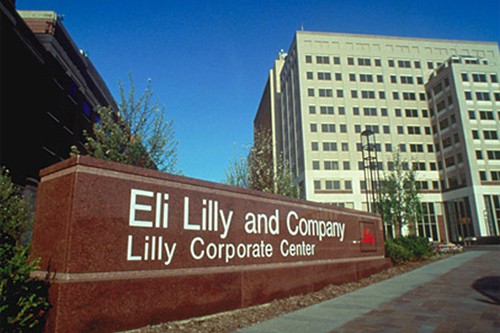
Lilly’s bid to mount a challenge to Pfizer’s blockbuster CDK4/6 inhibitor Ibrance takes another step forward with the presentation of new combination data for its abemaciclib candidate in breast cancer.
Lilly is in the final stages of preparing its marketing applications for abemaciclib, which it recently started describing as a best-in-class therapy with the potential to compete strongly with Ibrance (palbociclib) and Novartis’ CDK4/6 inhibitor Kisqali (ribociclib), the second to enter the market after its approval earlier this year.
The results of the MONARCH 2 study in hormone receptor-positive, HER2-negative advanced breast cancer resistant to endocrine therapy show that adding abemaciclib to treatment with the oestrogen inhibitor fulvestrant cut the risk of disease progression by 45%, compared to fulvestrant plus placebo.
Lilly’s drug achieved a median progression-free survival (PFS) of 16.4 months versus 9.3 months in the control arm, and the objective response rate (ORR) was 48% and 21%, respectively. Lead investigator George Sledge of Stanford University said: “This is believed to be the highest response ever recorded in this patient population in a large-scale trial.”
Sledge said the combination of abemaciclib and fulvestrant was reasonably well-tolerated, although Lilly’s drug was associated with diarrhoea – seen in 86% of patients versus 25% of the placebo group – which it says is manageable with anti-diarrhoeal drugs.
Some analysts suggest however that the side effect could make it tough for Lilly to compete with Ibrance and potentially also Kisqali, although Evercore ISI analyst Umer Raffat pointed out that abemaciclib can be dosed continuously whereas Ibrance is dosed for three weeks with one week off to address tolerability issues.
The data was presented at the American Society of Clinical Oncology (ASCO) over the weekend, although the top-line results have been available as an abstract for some time.
Ahead of the conference Leerink analysts said it was too early to say how abemaciclib will stack up against Ibrance, which saw sales almost triple to reach $2.1bn last year and has been tipped by EvaluatePharma to become a $6bn-plus product in 2022, with Kisqali and abemaciclib jostling for second place in the market.
A clearer picture of abemaciclib’s potential could come with the presentation of MONARCH 3 trial, which showed adding abemaciclib to aromatase inhibitors letrozole or anastrozole improved progression-free survival (PFS) in women with HR+/HER2-negative breast cancer, later this year. Top-line results were reported in April.
Lilly has also revealed that it has started a new phase III trial – monarchE – that will test abemaciclib as adjuvant therapy in early breast cancer.




